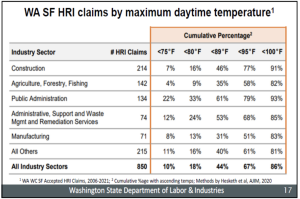Kudos to WCRI – it is the first workers’ comp research organization to give center stage to the impact of climate change – primarily heat – on workers’ comp claims.
Dr David Bonauto of Washington’s Labor & Industry (state WC fund) led a session on Washington’s analysis of climate change’s affects on workers. A few quick takeaways…
There have been three studies re Heat Related Illness (HRI) in WA based on 16 years of data. There were only about 850 accepted HRI claims out of 1.7 million…but the hidden impacts of heat are just beginning to be understood.
- Heat increases absorption of chemicals thru the skin and potentially increases toxicity, a major concern for ag workers working with insecticides and fertilizers
- Heat and wildfire smoke increases cardiovascular disease; it appears the mechanism is chronic inflammation.
- Excessive heat leads to “incredibly diminished productivity”
- There is a much higher [67%] risk of injury when temperatures are above 82-86 degrees compared to a baseline of 76 degrees.
- The most vulnerable industry? Public administration…my guess is this is driven by first responders and fire fighters.

thanks to MTI America’s Nikki Jackson for the slide pic
WA L&I isn’t the only organization doing credible research – WCRI research found 14% more claims occurred at times of high heat – think of these as indirectly related injuries. Falls off ladders are an example. Great to see WCRI dig into this, although it would have been even better if we had this information several years ago.
The second employer session provided much-needed perspective from executives dating with the fallout from climate change.
Joann Moynihan from Travelers said the industry needs to broaden this dicsussion…it’s not heat claims specifically, but heat-related claims…Ms Moynihan’s words to the effect of “this is an indication of where the. industry is headed” should be a wake-up call to stakeholders who are mostly sleepwalking through massive changes to the work environment.
Chrissy Lynch of the Massachusetts AFL/CIO described how workers in Mass are now dealing with forest fires…”we never thought we would”…that and it “doesn’t really snow here any more…we are trying to figure things out on the fly.
What does this mean for you.
Wake the *&^%** up.



Spot on, Joe. Ihave pointed out the changes in risk to employers based on the alleged climate change for a couple of years now. I don’t know if climate change is real or not – – and don’t particularly care what the political debate is. All I know is we are seeing very different weather patterns – waaaaaaay too many days over 100 degrees in Montana, flooding where we would never expect flooding, tornados in the US way outside of ‘tornado alley’ and forest fires on the east coast. Time to stop debating whether climate chane is real or not, and accept that the risk has changed. It is not only from the event itself, but the clean-up as well.
Thanks for the note Peter.
Agree it is way past time to accept risk has changed…those who stick their heads in the sand will find it washing away.
That said, there is no question climate change is real – this isn’t a political debate, it is an acknowledgement of scientific conclusion.
By ignoring, or rather choosing to not believe climate change is real, one sets aside the science and the conclusions from that science. This allows climate change deniers to avoid taking responsibility for and prepare for what is coming…they will claim, and are claiming these changes are just temporary, nothing to worry about.
That is flat out wrong. Reality is things are changing much more rapidly than the best case scenario, and may well exceed worst case.
Thanks for weighing in and encouraging others to get with it.
be well Joe